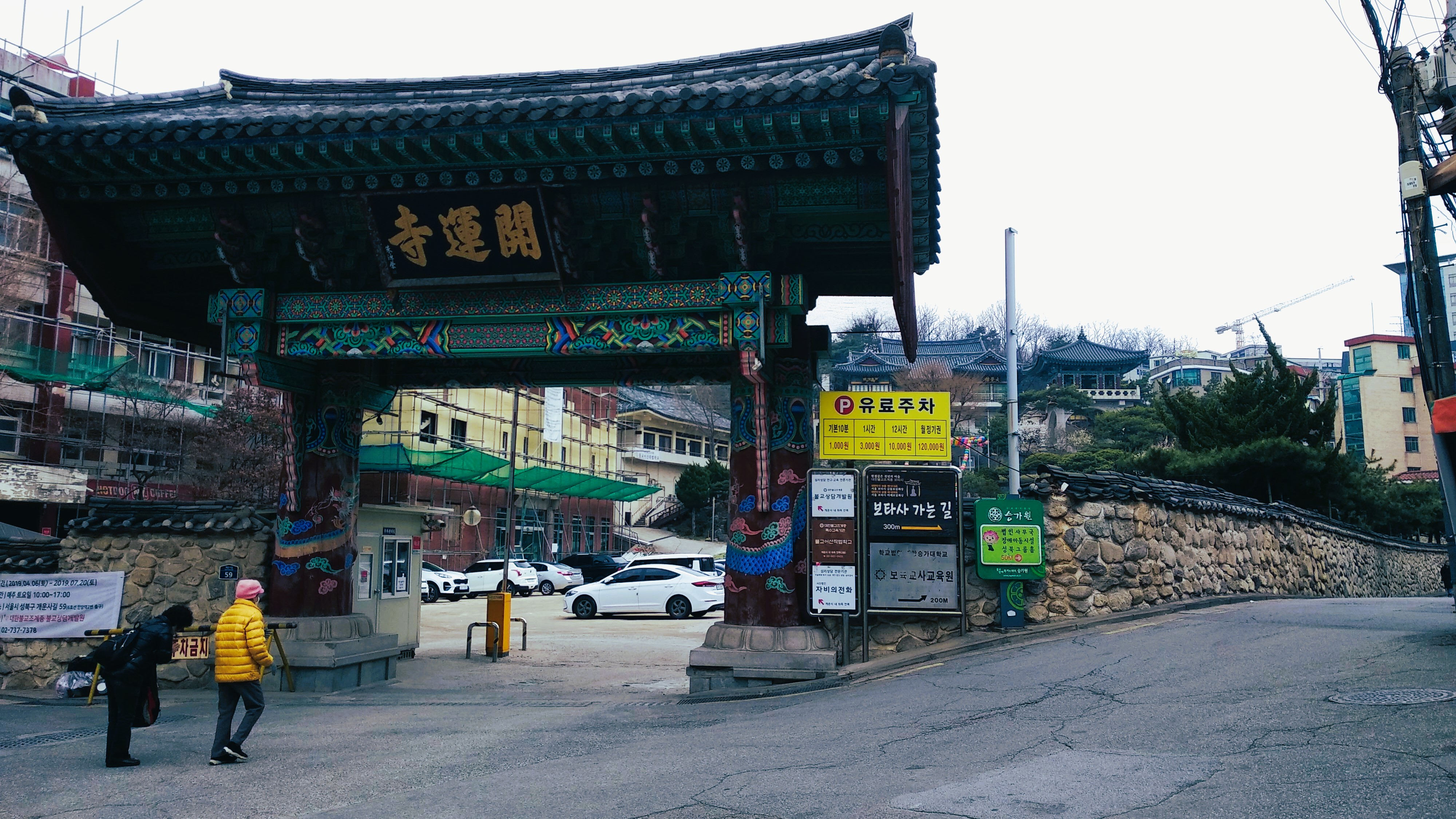開運寺
Apr. 3, 2019
This majestic gate was the first thing to appear to those entering Gaeunsa*, in the ward of Anam, where our dorm was sited. The temple was built on the slopes of a hill. Walking back to the dorms, up the hill, we all faced this sight at least once every day. The stone walls sorrounding the temple complex were the refuge of cats. They often rested near the main gate and other entrances, placing on the residents, on the monks and on the temple visitors the responsibility to feed them. When we walked next to these stone walls, the sight of the main building was almost completely obscured by the pine foliage, so that it was impossible to appreciate its architecture. The sounds, however, couldn’t be stopped by the trees, and signaled the activities of the monks to whomever passed by this neighbourhood, at different hours of the day. When coming down the hill, early in the morning and going to class, it was not unusual to hear the Buddhist prayers, reproduced through speakers that were placed on the main temple’s roof slopings. These prayers, which may have appeared monotonous at first, featured abrupt changes of tone, meaning that the note in which the monks were chanting would go up usually by a semitone, then coming back down again after a while. This feature gave the music an unpredictable and intriguing character.
After procrastinating for a couple of times, one day I finally decided that I would pay a visit to this temple. That visit was so impressive that, the same night, I decided to write a small text. I was quite desperate to draw from this visit a sort of life lesson. This is what I wrote that day.
Today’s morning serenity finally convinced me to visit this temple. There, I saw again those terracotta tiles on which one expresses, by writing them, his own desires. On one of these, a hundred traditional characters were distributed, in a rigorous sequence of shapes and sounds. There, I was received by an old lady, bent, as the cliché, by the weight of her own years. She asked me to follow her and enter the temple. While I removed my shoes, leaving my backpack and umbrella outside the building, I realised that the chants I had heard from the street down the hill were being played through some speakers, which were tied to the temple roof. I was disappointed. I thought that music was being played through some sort of Spotify list. This was my prejudice. As soon as I entered the temple, I faced a crowd of old Korean ladies, a few old men, and three monks. The monks were singing through a microphone, and their voice was amplified by the speakers, outside the walls. They looked at me and continued their prayer. The old lady took good care of me, giving me her book to pray to, and a pillow to kneel down upon. I remained in the temple until the prayer ended. It lasted at least thirty more minutes. All around me was a movement of women, faithful, old. Kneeling on my pillow, I listened to their voices. I tried to grasp the tone, the timbre. I questioned myself about the origin of this anxiety, which does not abandon me. This anxiety of others’ judgement. Of continuously having to reaffirm one’s value in the eyes of the world. I searched the causes of this need to overwhelm, to feel above others. This need to possess the body of others, and submit it. And at the core of it all I found the source of my weakness. A low and fragile self-esteem. A personality built on the need to satisfy the expectations of others, the ambitions of others. A structural insecurity: the fear of not being up to par. And hence, the obsessive search for security among the things of the world: academic prestige, respect of the peers, unconditional surrender of the other sex. I thought about this while I was in the temple. Then they took me to lunch.
I wish I could thank again that old woman. She allowed me with her into the temple, and then offered me a free meal. Before I left, I remember she even gave me a fruit juice and a snack. She told me to come back to the temple whenever I wanted, but I never did.
(*): Gaeunsa. Gae for 開 (kāi), meaning “opening”, “start”. Un for 運 (yùn), meaning “good luck”, “fortune”.